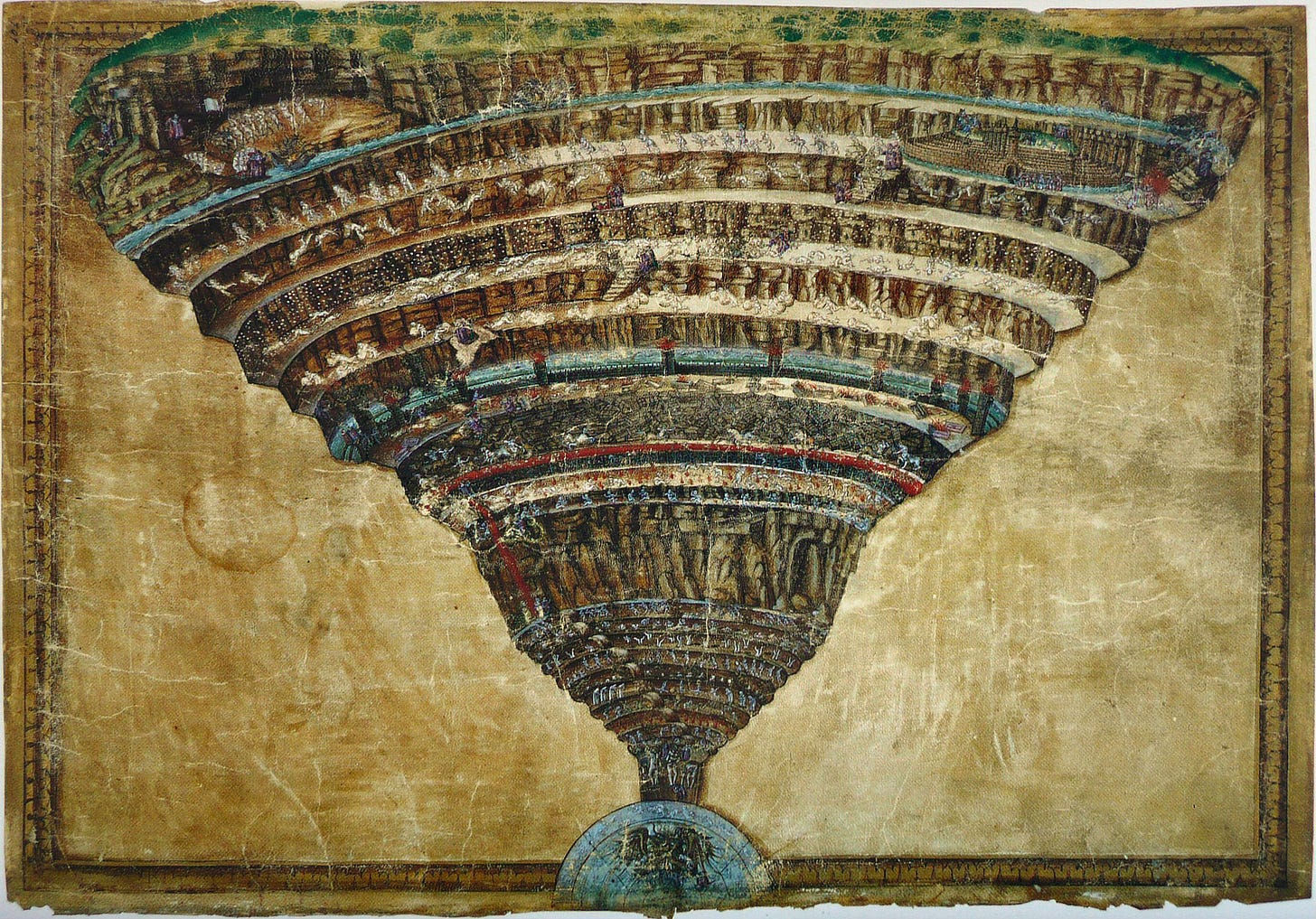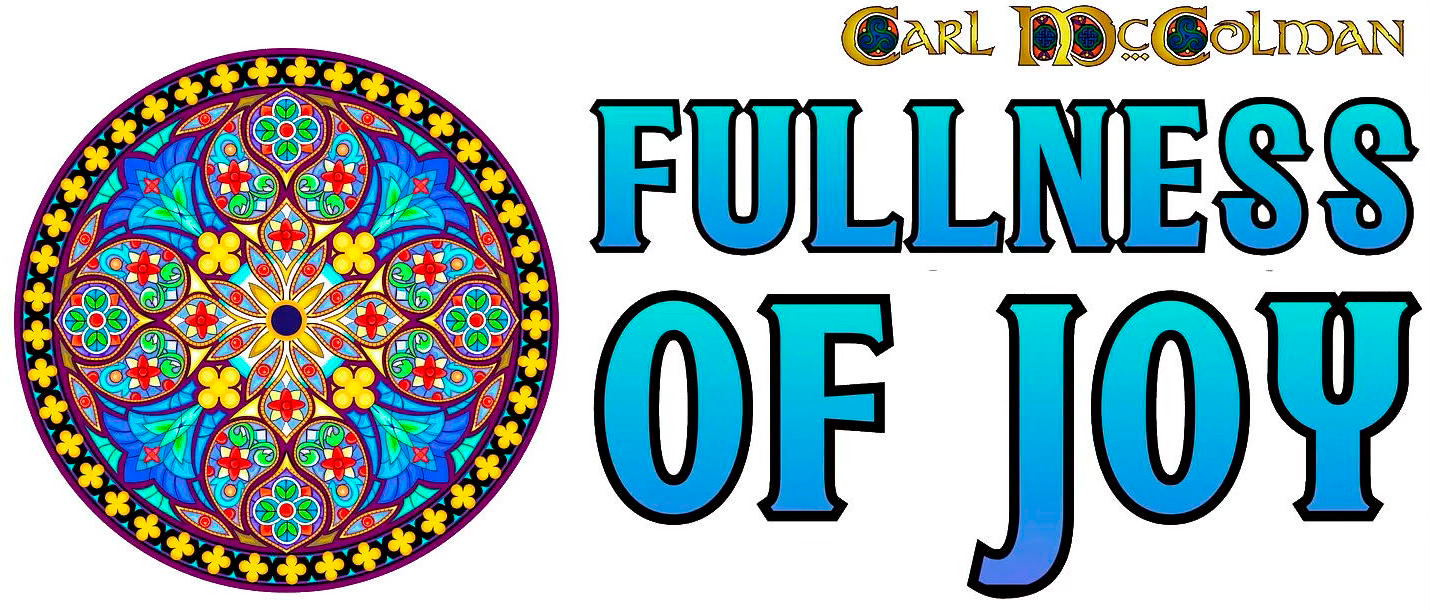A Hell of a Topic
Do Christian Contemplatives No Longer Believe in Eternal Punishment?
On my August 29, 2025 post Politics, Mysticism and Writing, a reader left a thoughtful and lengthy comment about mystical theology, interfaith dialogue, and the theology of hell. Read the entire comment here. I’ll just quote a few excerpts here, followed by a few of my own thoughts in response…
I saw a reference in the article that "Buddhists are going to hell" as a doctrine. This seems targeted at evangelical or conservative Christians as the perpetrators of this dogma.
I just wanted to mention that Buddhists believe in a hell, originating from Hindu thought. I'm sure many of us westerners are classified as going to hell from a traditional Buddhist perspective.
It's gruesome stuff and described in far more detail in the Buddhist religion vs Christianity.
I think before we lump the doctrine of hell in as an evil perpetrated by evangelical Christians, it's worth considering that it isn't an idea confined to a particular group of people targeted in the article (the lions).
I find it interesting that there seems to be an implied dogma in the modern Christian Mysticism movement that hell doesn't exist. It's a progressive idea I would say, not found in the traditional religions but more a fruit of the embedded dogma of inter-religious dialogue found within the movement.
Just to be clear, I never said that the doctrine of hell was “an evil perpetrated by evangelical Christians” — the last time I checked, hell is still a teaching of Catholic and Orthodox Christianity as well as Protestant/Evangelical Christians. Granted, many Christians in our time seem to be functionally universalist — in other words, they assume that God’s salvation is ultimately for everyone, which pretty much makes the concept of hell redundant. But even churches as liberal as the Episcopal Church or the United Church of Christ still technically acknowledge hell as a teaching of the Christian faith, even if in practice it is often regarded as little more than a myth or a metaphor.
I’ll grant that many Christians today no longer believe in a literal hell — and not just those of us who are inclined toward mysticism and contemplation. Likewise, I suspect that among other religions that have traditionally included imagery of hell in their cosmologies, there are many today who no longer take such teachings literally. It’s one thing to accept that the doctrine of hell is a part of the mythology or metaphorical teachings of a religion’s origins, and another thing altogether to insist that such metaphors and myths must be taken literally today. The first instance represents how many people of faith today think, whereas the second is a sign of fundamentalist thinking.
Hell as Metaphor and Myth
Granted, many Christians today are fundamentalist, and fundamentalism is found among other religions as well. But just because fundamentalism is widespread does not make it the most important or persuasive form of religious belief. I am clearly not a fundamentalist, and among other things, this means that I am not beholden to any kind of literalism in terms of what I believe. Like most non-fundamentalists, I am persuaded that hell is a metaphor, or a myth — and nothing more than that. I think belief in a literal hell is spiritually harmful. That may make me a poor fundamentalist, but it does not make me a poor Christian. If anything, it makes me a Christian Universalist, which I increasingly believe is the most compassionate and logical way for a follower of Jesus to be.
I think belief in a literal hell is spiritually harmful. That may make me a poor fundamentalist, but it does not make me a poor Christian.
Yes, other religions have their own version of belief in hell, but that does not make hell a more persuasive concept to believe in; rather it simply reveals that there is something archetypal or paradigmatic about belief in hell that transcends the cultural or dogmatic limitations of any one faith. We know that the concept of a great flood appears in many myths; that does not make it more reasonable to believe in a literal Noah's Ark — it merely helps us to see that certain archetypal symbols show up again and again in cultures all around the world.
Hell as a Metaphor for Divine Justice
Why is the myth or metaphor of hell so persuasive? I think it has to do with the human desire for fairness. We want and need God to be impartial, handing down justice in a balanced and reasonable way.
Every culture has to deal with people who cause harm: people who steal, who cause violence, who hurt and even kill others. As societies over the ages grew more complex, so too did the need for systems of justice and law to reassure us that God is not capricious, but rather stands for a just moral order.
Here's the thing: what do we do with the fact that some people really do commit terrible acts of violence or harm, terrible acts of economic or criminal injustice? Can we expect God to deal with such harm-causing people in a fair and just manner?
Questions like these help me to understand why the metaphor of hell became so attractive to our ancestors. Why wouldn't a just God create a form of punishment — even eternal punishment — to chasten those who refuse to turn away from their harmful ways?
Today we have the psychological savvy to understand that "eternal punishment" is not much of a motivator to get people to let go of actions or behaviors that cause harm. If anything, the threat of eternal punishment can be a disincentive (if God's going to send me to hell anyway, I may as well just keep on acting out). But we have to remember that when doctrines of hell were being formulated around the world, spiritual leaders lacked the psychological understanding that we have access to today. In a simpler age, belief in less complex models of justice and punishment were sufficient to maintain belief in God as a fair and just deity. But given what we know about the psychology of punishment, and the fact that even capital punishment or life imprisonment does not incentivize people to behave well, we can trust that a truly loving and compassionate God would have no interest in creating a form of eternal punishment.
Hell is a Metaphor for Waste
Let me go a bit deeper in explaining why I believe the doctrine of hell (especially an eternal hell) is spiritually harmful.
To believe in hell is to believe in a wasteful God, a God who would rather throw away the vast majority of his own creation rather than create the necessary conditions to preserve it. And while proponents of the doctrine of hell insist that damnation is entirely humanity’s fault, both individually and collectively; any reasonable consideration of the balance of power between finite humanity and infinite deity will quickly see how absurd that argument is. Is hell a form of punishment? That’s on God. Is hell eternal, with no possibility of learning from one’s mistakes, of growth, of redemption? Also the fault of the most powerful party.
Of course, I don’t blame God for hell: I blame hell on the limited imagination of ancient humans (and modern fundamentalists) who could not envision any better way for God to bring healing to those who willfully create suffering. That this doctrine continues to be proclaimed (among fundamentalists, anyway) is evidence that even today, too many of us are not able to question the deep irrationality at the heart of this monstrous doctrine.
To believe in hell is to believe in a wasteful God
Is it any wonder that we live in a society where there is so much waste, where the landfills and dumps are bursting at the seams, where tons and tons of old clothing are piled up in the deserts of South America, piles so huge that they are visible from space? That our incinerators are spewing toxic chemicals into the atmosphere because we have no other recourse for our waste than to burn it? We have created a society of garbage because the most dominant image of God is that of a creator of garbage.
Such a theology is deeply insulting to God, let alone to humanity.
Yes, humans can do horrible things that lead to unimaginable suffering, and many of us are hateful, spiteful, vicious creatures. But until we start to understand that a God who is Love is a God whose capacity for healing and reconciliation is greater than the worst human sin, we will stuck on a treadmill of continually reinforcing our worst ideas about the cosmos and ourselves — sending too many people the message you may as well be bad, because you live in a bad universe. And so the cycle replicates itself.
Impenitence and Punishment
But what about the person who refuses to repent? This is the question that CS Lewis poses in The Great Divorce: that there is, theoretically at least, a type of person who simply and ultimately refuses to yield to love. The person whose heart is so turned in on itself, so committed to selfishness and pride, that there is no hope for that person to ever feel contrition, or compunction, or repentance. Wouldn’t such a person essentially be consigning themself to an eternity of torment, the torment of consciously and freely choosing to reject love, for all eternity?
What a nightmare scenario.
And, I might add, one that seems to be completely unwilling to entertain any notion that such a person might be shaped by trauma, suffering from addiction or some sort of mental illness, or in some other significant way incapable of making a truly free moral choice. In other words, the person who declares “I will never yield to love” is essentially declaring “I have been so wounded and traumatized that I am completely and thoroughly incapable of seeing myself as joyfully responding to love.”
And even if the person who rejects love does so with absolute autonomous freedom, fully aware of the consequences of their choice, must we really assume — based on ancient beliefs and a narrow interpretation of ancient texts — that God will simply consign such a person to an eternity of conscious torment, with no possibility of future repentance or growth/healing?
Once again, God ends up looking like the monster here. Belief in hell is a blasphemy against the God who is love.
I’m not interested in blaspheming the God of love, even if it means rejecting a long-standing tradition regarding how New Testament passages describing hell have been interpreted. I’d rather be a universalist with a clear conscience as I worship the God of love, than someone so invested in a dualistic interpretation of the Bible that I end up placing limits on God’s love in the interest of preserving my interpretation of this ancient (read: obsolete) doctrine.
What Would Jesus Do?
One final thought. Many years ago (I was in college at the time, and let’s just say Ronald Reagan was president!), I happened across a document written by a Unitarian Universalist, that forever changed the way I think about the doctrine of hell. I’ve long since lost the document, so I can’t tell you what its title was, or even who wrote it. But I remember that it posed this question:
If there really is a hell, and Jesus Christ is really the compassionate savior that Christians proclaim he is, doesn’t it stand to reason that Jesus would himself insist on going to hell, simply so that he might minister to those who are suffering there?
What a question! Needless to say, a question that had never been posed to me before. But it forced me to rethink both what I believed about hell, as well as what I believed about Christ. Since that time, I have learned about many ways that Christians have danced around belief in hell. There’s the seventh century mystic St. Isaac of Syria, who all but declared that heaven and hell are simply one — if we accept the full love of God, we experience it as light, but if we reject it, then we experience it as fire (he does not address the possibility of repentance from hell, but if the fires of hell are fueled by love, it only stands to reason that love will always be ready to offer healing and comfort to those willing to accept it). An even better idea comes from the 20th century theologian Hans Urs Von Balthasar, who essentially argued for an “empty hell” — that it is reasonable to assume that hell exists, since God would lovingly give everyone the opportunity to choose whether to accept God’s love or not. But it is absurd to assume that any human being, healed of their trauma and given the ability to reason and see clearly, would opt out of the felicity of heaven. Therefore, we can believe in hell, but we can also believe that it will remain empty even after judgment day. And then of course, William Blake imaginative re-visioned hell not as a place of punishment but as a place of liberty, and C. S. Lewis came up with his famous argument that hell only exists as a place freely chosen.
This is all well and good, but these arguments all feel like ways to avoid the real issue which is simply this: hell is a monstrous doctrine that serves no good purpose. When it comes to teaching about the consequences of sin, we can do better.
To wrap up my response to my reader’s comment: rejecting belief in hell is not a “dogma” — it is simply a reasonable way to believe. Yes, there have been many mystics who believe in the doctrine of hell, but like St. Isaac or Julian of Norwich, there have been those who have found this doctrine difficult or absurd. So rejecting hell is not just something “liberal mystics” do — it’s a natural consequence of anyone who weighs religious doctrine in the light of our best knowledge of psychology, sociology, and human behavior.





